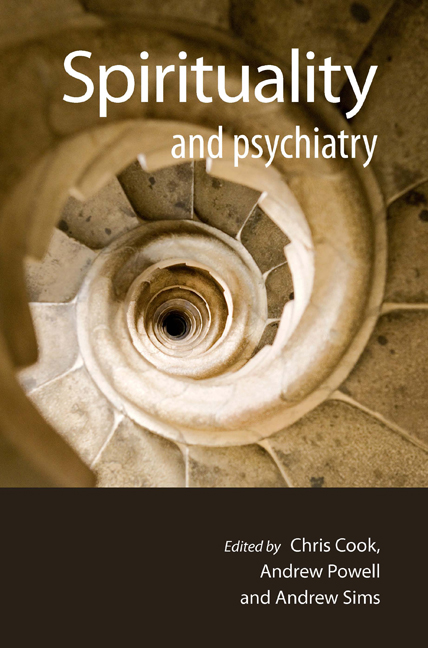Book contents
- Frontmatter
- Contents
- List of contributors
- List of tables, boxes and figures
- Foreword
- Preface
- The Spirituality and Psychiatry Special Interest Group of the Royal College of Psychiatrists
- 1 Spirituality in psychiatry
- 2 Assessing spiritual needs
- 3 Psychosis
- 4 Suicide
- 5 Child and adolescent psychiatry
- 6 Psychotherapy
- 7 Intellectual disability
- 8 Substance misuse
- 9 Neuroscience of the spirit
- 10 Spiritual care in the NHS
- 11 The transpersonal perspective
- 12 Religion and religious experiences
- 13 Pathological spirituality
- 14 Ageing
- Index
10 - Spiritual care in the NHS
- Frontmatter
- Contents
- List of contributors
- List of tables, boxes and figures
- Foreword
- Preface
- The Spirituality and Psychiatry Special Interest Group of the Royal College of Psychiatrists
- 1 Spirituality in psychiatry
- 2 Assessing spiritual needs
- 3 Psychosis
- 4 Suicide
- 5 Child and adolescent psychiatry
- 6 Psychotherapy
- 7 Intellectual disability
- 8 Substance misuse
- 9 Neuroscience of the spirit
- 10 Spiritual care in the NHS
- 11 The transpersonal perspective
- 12 Religion and religious experiences
- 13 Pathological spirituality
- 14 Ageing
- Index
Summary
Spirituality has been a part of the professional code of practice for physicians and other healthcare professionals in the UK since the inception of the National Health Service (NHS) in 1947. At that time, legislation was passed to ensure that the religious and faith needs of patients were met in the healthcare system (Speck, 2005). This was reinforced by The Patient's Charter (Department of Health, 1991) and in a subsequent health service guidance letter, The Provision of Spiritual Care to Staff, Patients and Relatives (Department of Health, 1992). This guidance was replaced in 2003 to reflect new organisational relationships and to provide better support for the multi-faith needs of patients (Department of Health, 2003a).
One could, however, be forgiven for not having a clear picture of how spiritual care is provided within today's NHS. The issues around delivering such care are indeed complex. Orchard (2001: p. 17) notes that ‘the NHS is an organism that demands of its services an ability to think through its considerable complexities and to respect its need for a degree of discipline in the way care is developed and delivered’. However, this does not appear to be the case with services for spiritual care and Orchard calls for those services to be ‘effective, equitable and better able to respond to those who call on them’. There is a lack of published material on the provision of formal spiritual care services within the health sector. It certainly appears to be a hotchpotch of policies and influences. It would seem that in the reforms that saw mental health trusts splitting off from acute and community trusts, many pastoral care departments were left behind. With no specific service level agreements or funding streams, this area of care was, and still is, often ignored.
What is spiritual care?
It is not only chaplains who provide spiritual care to patients. In chapter 2, ‘Assessing spiritual needs’, the authors call for collaboration between professionals in this area of patient care. The notion of what spiritual care actually entails requires consideration. Murray et al (2004), in a study of patients with life-threatening illnesses, defined spiritual needs as ‘the needs and expectations which humans have to find meaning, purpose and value in their life.
- Type
- Chapter
- Information
- Spirituality and Psychiatry , pp. 190 - 211Publisher: Royal College of PsychiatristsPrint publication year: 2009

